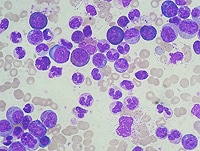Ponatinib (Iclusig, previously AP24534) is an Food and Drug Administration approved oral drug candidate developed by ARIAD Pharmaceuticals for the treatment of chronic myeloid leukemia (CML) and Philadelphia chromosome positive (Ph+) acute lymphoblastic leukemia (ALL). It is a multi-targeted tyrosine-kinase inhibitor.[1] Some forms of CML, those that have the T315I mutation, are resistant to current therapies such as imatinib. Ponatinib has been designed to be effective against these types of tumors.[2]
Oncologists have complained, however, that many patients can not afford the "astronomical" cost of $138,000 a year, which makes it one of the most expensive drugs in medicine, and far more expensive than what is needed to pay the development costs.[3][4] WIKIPIDIA
THE THROMBOTIC COMPLICATION WAS NOT NEW HOWEVER, IT IS UNCLEAR WHY THE FDA MOVED TO ORDER ARIAD TO STOP THE PRODUCTION.
"The United States Food and Drug Administration issued a partial clinical hold on new trial enrollment for Iclusig on 9 October 2013 due to an increased number of blood clots observed in patients taking the drug.[6] The EPIC trial was later cancelled on 18 October.[7]"WIKIPEDIA
